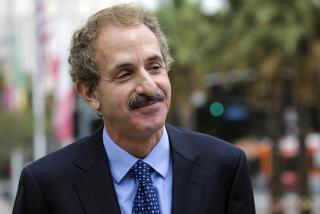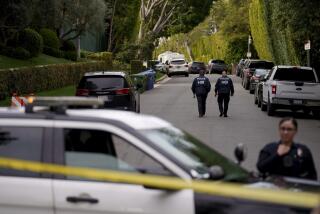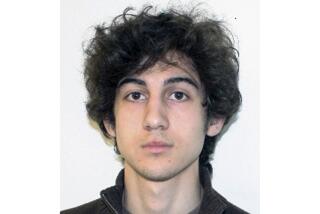Legal Issues May Jeopardize Evidence Against McVeigh : Law: Suspect appeared at hearings, met agents before learning his rights or seeing a lawyer, records show.
In a development that could cloud some evidence in the Oklahoma City federal building bombing case, records show that suspect Timothy J. McVeigh talked briefly with FBI agents before he was advised of his rights in the case and that he was unable to contact a lawyer during a crucial period after he became a suspect in the explosion that killed 169 people.
Transcripts released this week of two court hearings that took place on the day McVeigh was arrested in the April 19 bombing show that he was not afforded an attorney until after he had made a potentially incriminating comment and agreed to searches of his clothing, hair and fingernails.
The fruits of those searches could play an important role in his prosecution because the government investigation is built largely on circumstantial evidence.
Legal experts said they believe that what McVeigh initially told the FBI after his arrest could be inadmissible as trial evidence because he said it before he was advised of his rights.
“There’s a strong likelihood that any statement made during a custodial period before a suspect is advised of his rights could be excluded,” said Plato Cacheris, a prominent criminal defense attorney in Washington.
The way investigators handled McVeigh in the period after he was pulled over for a traffic violation and then became the leading suspect in the worst act of terrorism committed on U.S. soil could be a particularly sensitive issue as the case moves toward its historic trial.
The government is likely to contend that McVeigh’s initial warning of his rights when he was arrested on lesser state charges carried over to the FBI’s first contact with him.
But defense attorneys for McVeigh consider the initial handling of him as a serious matter. Stephen Jones of Enid, Okla., McVeigh’s lawyer, said that the FBI created a tactical blunder during the arrest that could sharply undercut much of their evidence against his client.
“They were interfering with his constitutional rights from the very beginning,” Jones said. “Unquestionably, his rights were trampled on.”
McVeigh’s attorneys said that they plan to file arguments in federal court in Oklahoma City demanding that all the evidence from the search and McVeigh’s statement be expunged.
Steve Mullins, an assistant U.S. attorney in Oklahoma City who is a spokesman for the government’s case, has repeatedly stated that his office will not discuss the nature of any evidence.
Legal experts consulted by The Times did not go nearly as far as McVeigh’s attorneys. Joshua Dressler, a professor of constitutional criminal procedure at McGeorge Law School in Sacramento, for example, noted that any problem for the government from the initial handling of McVeigh likely would be limited to his statement and not extend to the searches to which he consented without consulting a lawyer.
“I think it raises a possible constitutional issue in terms of Miranda or the Miranda line of cases,” he said, referring to the Supreme Court’s ruling that a suspect must be told of his right to remain silent and his right to be represented by an attorney and that anything he says may be used as testimony against him.
The explosion occurred at 9:02 a.m. on Wednesday, April 19. McVeigh was arrested at 10:20 a.m., driving north on Interstate 35 in Noble County. He was stopped for having no license plate on his 1977 Mercury Marquis.
He also was charged with firearms offenses because he was wearing a military-style pistol in a shoulder holster under his jacket.
He was taken to the Noble County Jail here. At that time, no one suspected him in the Oklahoma City bombing. He normally would have been released on bond by the following day.
But because Judge Danny G. Allen was preoccupied with a complicated divorce case on April 20, McVeigh’s bond hearing was put over until Friday, April 21.
At 10:30 a.m. on that day, McVeigh was brought down from the jail for his bond hearing on the state charges. About that same time, Sheriff Jerry Cook said, he received a call from a federal agent. When the sheriff realized that McVeigh was a bombing suspect, he was placed on federal hold.
The first thing he did, the sheriff said, was shut down all the telephones in the jail. He then returned McVeigh to his cell.
McVeigh tried repeatedly, without success, to phone an attorney, Royce A. Hobbs, a local lawyer with offices across the street from the jail, according to others in the jail. At one point, McVeigh was said to have slammed down the phone when he could not get through.
Not long after, he was brought back to court for the bond hearing. According to the transcripts, he appeared alone without a defense attorney.
When the hearing began, the first thing that the local prosecutor, Mark L. Gibson, asked was whether McVeigh was right-handed or left-handed. “Right,” McVeigh said.
According to Jones, Gibson asked that question only to find out if McVeigh fit the description in the FBI’s composite drawing, which said that “John Doe No. 1” was right-handed.
“Those are not routine questions in a bond hearing,” Jones said. “He was asking those [questions] at the request of federal officials to help them determine if they had the man who was their prime suspect.”
Gibson, however, said he asked McVeigh that question only because he was in handcuffs and that a jailer needed to undo one of the cuffs so McVeigh could sign court papers. “Oh Lord, no,” Gibson said. “I was never asked to try to get any information out of him.”
The judge set $5,000 bail and asked McVeigh if he would be able to make the bail. “I’m unsure,” McVeigh said. “I only have a couple of grand cash. I don’t know about a bond. I don’t know what to do.”
Two FBI agents arrived about noon. Before they told him he was a suspect in the bombing, McVeigh said he knew they were there because of “that thing in Oklahoma City, I guess.”
According to FBI reports obtained by The Times, “McVeigh then stated he didn’t think he should talk to the agents without first talking with an attorney.”
He was given a copy of a form advising him of his rights. He read the document aloud. The FBI reports said that McVeigh “then stated he understood his rights but wasn’t going to sign the form.”
Hobbs has repeatedly refused to talk to the press but, according to sources close to the case, he tried repeatedly to reach McVeigh. Normally, local attorneys have unrestricted access to their clients in the jail.
Hobbs filed an unusual motion at 4:17 p.m. demanding to see McVeigh. He complained that McVeigh had called his office “three times” to no avail. Hobbs also said he could not get into the jail to see McVeigh because he was “denied access by the office of the Noble County sheriff, ostensibly under directions of the Federal Bureau of Investigation.”
Sheriff Cook, however, denied that assertion, saying that he had never been notified that Hobbs was McVeigh’s attorney.
A second hearing was convened on Hobbs’ motion. But by that time, the courthouse had been closed and the public was prevented from attending--another point that Jones sees as a tactical error by the government.
Judge Allen granted Hobbs’ motion and allowed the lawyer to confer with McVeigh. According to sources, the lawyer advised him that he was in “deep trouble,” that the bombing was a “death penalty offense” and that he should talk to no one until he had a federal defense attorney.
Gibson dismissed the state charges against McVeigh.
According to the court docket sheet, the only people present at the hearing besides the principals were “numerous law enforcement officers.” Cook, in an interview later that day with reporters who were denied access to what presumably should have been an open court proceeding, joked and said there was “nobody there but us chickens.”
Serrano reported from Perry and Ostrow from Washington.
More to Read
Start your day right
Sign up for Essential California for news, features and recommendations from the L.A. Times and beyond in your inbox six days a week.
You may occasionally receive promotional content from the Los Angeles Times.







